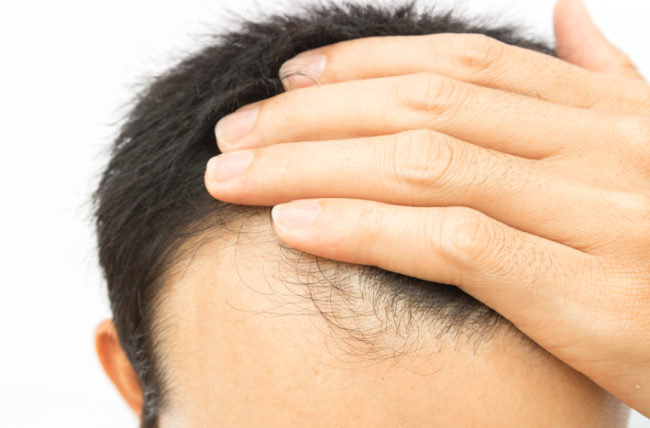
Closeup young man serious hair loss problem for hair loss concept or shampoo product, health care and medical
One cannot find out the reason behind the immense loss of hairs on its own! Experts these days perform multiple advanced, painless techniques to resolve the hair loss problems. Usually, physicians examine hair shafts, or follicle to identify the causes like infection or physical destructions. Sometimes the reasons may differ due to any surgery, pregnancy, hormonal imbalances, and others. At Chandra Clinic, we follow the proper treatment channel, finding the cause of hair loss, and treating our patients with customized solutions, ensuring maximized results.
Here in the given blog, the readers will get a glimpse of fundamental diagnosis methods and treatment procedures for the Hair loss problem.
Understanding Hair Loss
Losing some strands of hair every day is pretty normal for each one of us. Even if you lose about 100 strands are considered normal according to several medical studies. The concern arises when this loss exceeds, and the person develops the problem of thinning hairs, gradual baldness, extreme hair loss daily, or having a family history. However, this type of hair loss has been seen with people of age crossing 50 years, but nowadays, stress, anxiety, and rising health issues have increased in patients of younger age, too!
Diagnosis
In case of massive hair loss, your doctor will set up a physical examination and likely ask some important questions regarding hair care routine, medical history, hereditary problems, daily diets, and so on. If this doesn’t give satisfactory results, you might have to undergo a few tests that include Scalp biopsy, Light Microscopy, Pull Test, or Blood Test.
Treatments for Hair Loss
At Chandra Clinic, you will be served with effective hair loss treatments and therapies by the experts. There are several methods applied by dermatologists and physicians according to the different types of hair loss; in some cases, it is totally reversible. Also, conditions like alopecia areata (patchy hair loss); your hair may regrow within the span of a year. Below you will see a brief about multiple treatments, including medications and surgery for Hair Loss.
Most of the time, people may face a tremendous amount of hair loss due to strong medications for an underlying disease. If you are having reactions against medications, doctors may advise you to stop for further treatments.
To treat infections or temporary hair loss problems, few common medical treatments have shown positive results are;
• Minoxidil (Rogaine):
Minoxidil is a non-prescription medicine available in the form of foam, shampoo, and conditioners that is believed to be most effective in controlling hair loss. The patient needs to apply the medicated liquid once or twice as per the requirement. It is recommended to apply the foam on wet hairs.
As a result, people have seen regrowth of hairs and gradually improved hair loss but needed to follow the treatment for a minimum of 6 months. If the medicine suits you, you can continue to retain the benefits for a bit longer. However, if any irritation of unwanted hair growth is witnessed on face and hands, immediately stop using Minoxidil related products and seek medical help.
• Finasteride (Propecia):
Basically, Finasteride is a prescribed drug pill recommended for male baldness. The medicine is strictly recommended for men under the age of 60 years. You can take the pill daily to experience new hair growth and a slower rate of hair loss. One needs to take the medication for a few months to check out the results.
However, there are the rare occurrence of side effects noticed that might include diminished sex drive or risk of prostate cancer.
Surgery- Hair Transplantation
Today, Hair Transplant surgeries are mostly recommended to diminish the causes of massive hair loss, and people enjoy effective outcomes, too. In the process, the surgeon will take a part of hairs from the healthy area of the scalp and transplant it to the bald spot. Each patch of hair contains mini or micrografts. Sometimes, the surgeon can take a larger strip of the skin, including multiple hair groupings, to fill the area sufficiently.
It’s an outpatient surgery, but it may cause pain to the patient and some possible risk as well. However, medications and post-surgery precautions minimize the risk of catching infections.
Laser Hair Therapy
Laser Hair treatments are the most recommended treatments these days, as it is painless, effective, and non-surgical to treat major hair loss at minimal risks. Low-level laser therapies are considered as the safest and trusted method by experts from all over the world. In performing the treatment, it will take a laser instrument that contains 160 therapeutic soft low light level lasers covering the area of the patient’s head. It works on the scientific procedure of photo-bio-stimulation, where light emitted from the laser stimulates cell metabolism and repairs the damaged cells.
Conclusion- It’s necessary to maintain good hair hygiene that prevents numerous hair and scalp from severe infections. A nutritious diet plays a vital role in keeping good hair health. Meanwhile, medical science advancement has bestowed the world with effective treatments to get over the root cause of massive hair loss problems.
May is Small Business Month, a time to honor and recognize the achievements of the… Read More
Swiss International University (SIU) is on track to be one of the world's most respected… Read More
In a session that left students buzzing with fresh ideas and practical insights, Invertis University… Read More
At the 21st Shanghai International Automobile Industry Exhibition, which is surging with the wave of… Read More
Liverpool, UK—House of Spells and Comic Con Liverpool are once again collaborating to bring the… Read More
Introduction In India's booming EdTech space, there's one name that's making waves among Telugu students… Read More